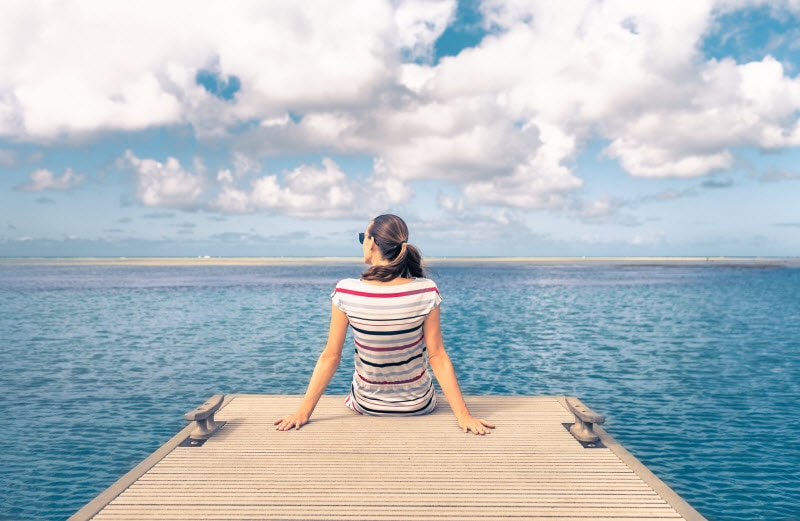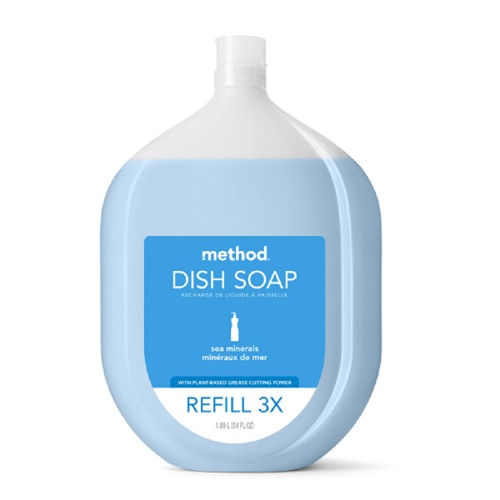[vc_row][vc_column][vc_column_text]In an increasingly urbanized world, we’ve learned the importance of
connecting with nature and its associated health benefits. The impact of green spaces – such as parks, gardens and forests – on well-being has been studied extensively. But what about the
blue spaces that cover 71 percent of our planet?
You might think all outdoor spaces have the same influence on our bodies and minds, but
recent research suggests that even just simple proximity to aquatic environments may have the most profound impacts. Let’s take a closer look at these spaces and how you can reap the benefits of surrounding yourself with blue — even if you don’t live near water.

What are blue spaces?
From babbling brooks and roaring rivers to coastal seas and vast oceans, blue spaces are outdoor areas covered by natural bodies of water that are easily accessible to people.
Whether you’re visiting in person, viewing from the comfort of home or simply residing nearby, blue spaces have the power to affect health in remarkable ways – and the reason may be linked to our evolutionary past.
“We as a species have a deep-rooted connection to water, as we have spent most of our evolutionary past alongside it,” said Dr. Mathew White, an environmental psychologist, on Dr. Sanjay Gupta’s podcast
Chasing Life,
Go to the Beach, Doctor’s Orders. “This gives us a kind of hard-wiring appreciation for these spaces.”
Perhaps you’ve intuitively felt what White puts to words as your shoulders relax while listening to the sea’s crashing waves or as your mind calms when admiring an ever-changing stream. Whether realized or not, we as humans have a strong affinity for water recognized by its healing effects on our mental and physical health.
What are the benefits of blue spaces?
From ancient Roman bathhouses to Japanese hot springs, humans have used water as a therapy long before the science was there to back it up. But what exactly
is health-enabling about blue spaces?
1. Encourages multi-sensory restoration
The sound of crashing waves. The smell of ocean air. The visuals of an ever-changing sea. The beach is just one example of how blue spaces capture our senses at every level, calming our minds and empowering us to tune in to the natural surrounding environment.
“Proximity to coastal areas provides more opportunity for restorative experiences and reduces the ‘noise’ in people’s minds — even more so than green spaces,” says
United Kingdom’s Environmental Agency. And consequently, “those who live within a kilometer of a natural body of water are less likely to feel anxious or depressed.”
Moreover, because blue spaces are multi-sensory, they draw us in fully, encouraging mindfulness – a practice that’s hard to live by when residing in chaotic urban areas.
2. Promotes physical activity and lowers disease risk
We all know the importance of physical activity for health and well-being. When we’re in the vicinity of blue spaces, we’re more
likely to move our bodies in ways we normally wouldn’t.
From running and walking to swimming and surfing, water encourages all kinds of exercise, and it’s activities like these — in or near blue spaces — that growing research shows reduce several mental and physical ailments, such as:
- Stress and anxiety
- Diabetes
- High blood pressure
- Cancer
- Depression and grief
- Heart disease
- Trauma and PTSD
- Ulcerative colitis
Imagine instead of medication a doctor prescribes you a visit the beach as a treatment for your anxiety and recurring stomach ulcers. A future like this may be more likely than you think as a new area of healthcare is emerging called
blue care, inspired by blue space research.
3. Fosters human connection
From creativity and play to feelings of awe and empathy, the qualities that make us innately human are fostered by aquatic spaces – which additionally serve as destinations where we can come together, socialize and build community.
According to the
Journal of Landscape and Urban Planning, “social interaction and its associated psychological effects were the most important benefits” for those congregating in blue spaces. Another study found coastal and marine areas to be
the happiest locations when compared to urban environments.
Harnessing the benefits of blue spaces
While blue spaces are widely available, not everyone may have direct access. In fact, only
40% of the U.S. population lives in coastal areas.
But according to Catherine Kelly, author of
Blue Spaces: How and Why Water Can Make You Feel Better, you don’t have to live near a natural body of water to reap the benefits.
“There’s being in it, next to it and even just thinking about it,” Kelly says. “You can experience the same positive effects from urban fountains, raindrops and even your shower.”
If blue spaces aren’t available to you for, you can still benefit by:
Watching videos of aquatic environments. Similar to the way
viewing pictures of green spaces reduces stress, so does watching movies of marine environments. A quick online search will reveal countless videos of the ocean, as well as live aquarium feeds.
Taking a cold shower. Cold water stimulates the vagus nerve – a cranial nerve extending from the brainstem and down to the abdomen – triggering an anti-inflammatory response that reduces feelings of anxiety and depression.
Bathing. Immersing yourself in hot water can ease sore joints and muscles. Moreover, you can customize your bath experience (temperature, lighting, music and even aroma) to promote relaxation.
Embracing the rain. Listening to the sound of rain or watching raindrops fall from the sky offers similar therapeutic effects as witnessing the natural ebb and flow of bodies of water.
Conserving blue spaces
Since the dawn of mankind, humans have been intimately connected to the natural world. Conserving these environments — blue spaces especially — should be at the forefront of everyone’s minds.
“Research on the impact of blue spaces is vital to convincing governments to protect and encourage the use of coastal spaces,” says
Dr. White. “We need to help policymakers understand how to maximize the benefits of blue spaces while ensuring access is fair, inclusive and free from damage.”
Just as our health and well-being are influenced by these spaces, we have an influence on them too. As stewards of the land it’s our responsibility to protect and maintain the biodiversity of blue spaces for — not just
our health — but for the health of our planet and future generations.
In other words, when we take care of blue spaces, blue spaces take care of us.[/vc_column_text][/vc_column][/vc_row][vc_row][vc_column][vc_text_separator title="Featured Products" border_width="2"][vc_row_inner equal_height="yes" content_placement="middle" gap="35"][vc_column_inner width="1/3"][vc_single_image image="164131" img_size="full" alignment="center" onclick="custom_link" img_link_target="_blank" css=".vc_custom_1672248746315{padding-right: 7% !important;padding-left: 7% !important;}" link="https://www.vitacost.com/the-seaweed-bath-co-hydrating-soothing-body-cream-unscented"][/vc_column_inner][vc_column_inner width="1/3"][vc_single_image image="164130" img_size="full" alignment="center" onclick="custom_link" img_link_target="_blank" css=".vc_custom_1672248765585{padding-right: 7% !important;padding-left: 7% !important;}" link="https://www.vitacost.com/garden-of-life-oceans-3-better-brain-with-omegaxanthin-90-softgels-2"][/vc_column_inner][vc_column_inner width="1/3"][vc_single_image image="164129" img_size="full" alignment="center" onclick="custom_link" img_link_target="_blank" css=".vc_custom_1672248788417{padding-right: 7% !important;padding-left: 7% !important;}" link="https://www.vitacost.com/chesapeake-bay-candle-aromascape-awaken-ocean-air-13-5-oz"][/vc_column_inner][/vc_row_inner][/vc_column][/vc_row]




